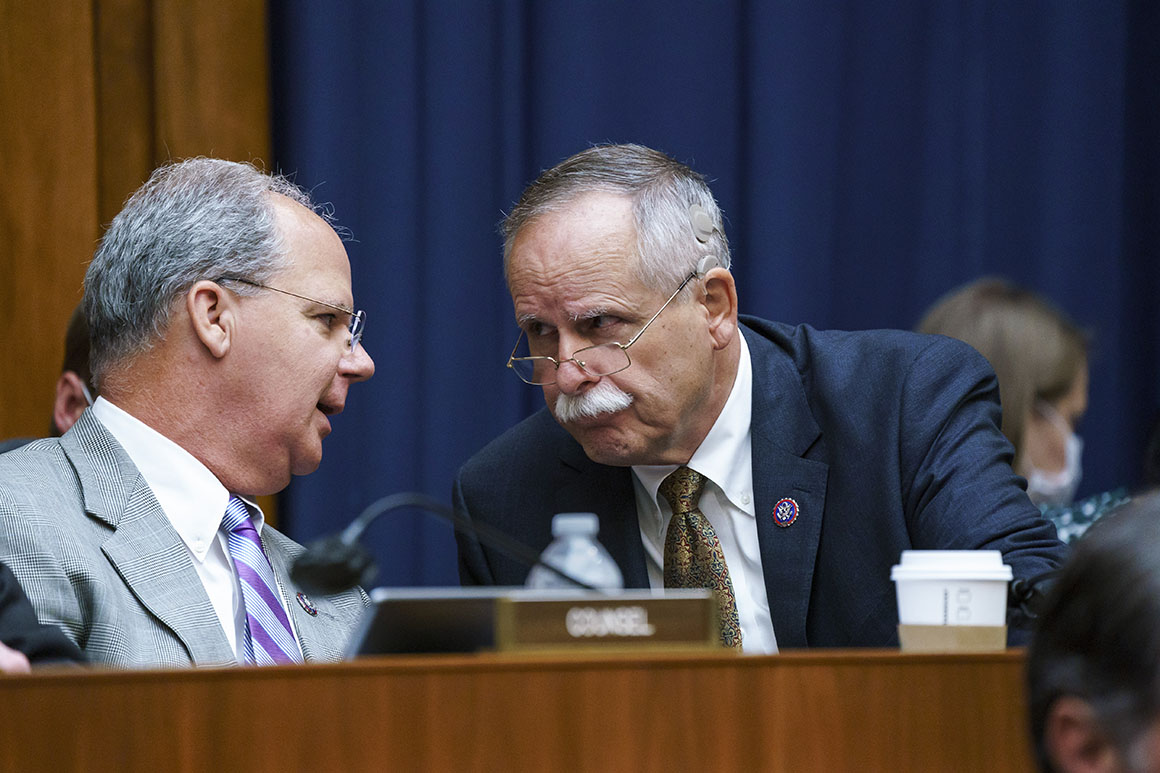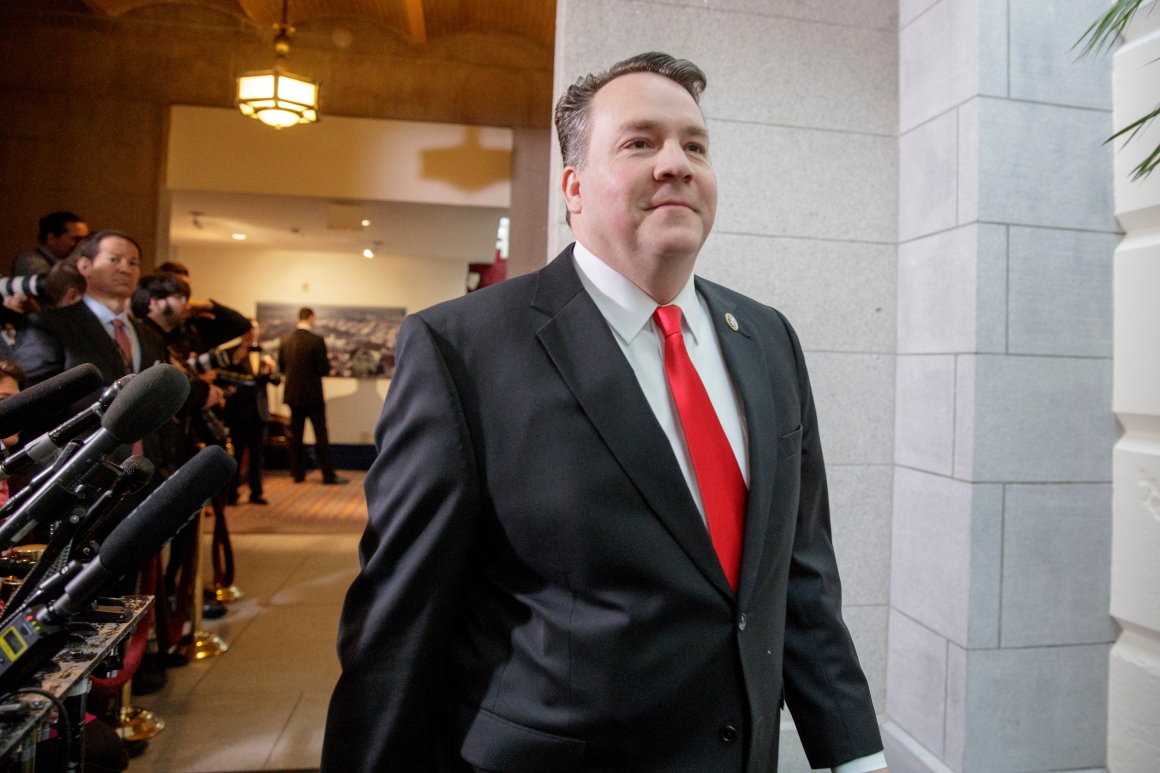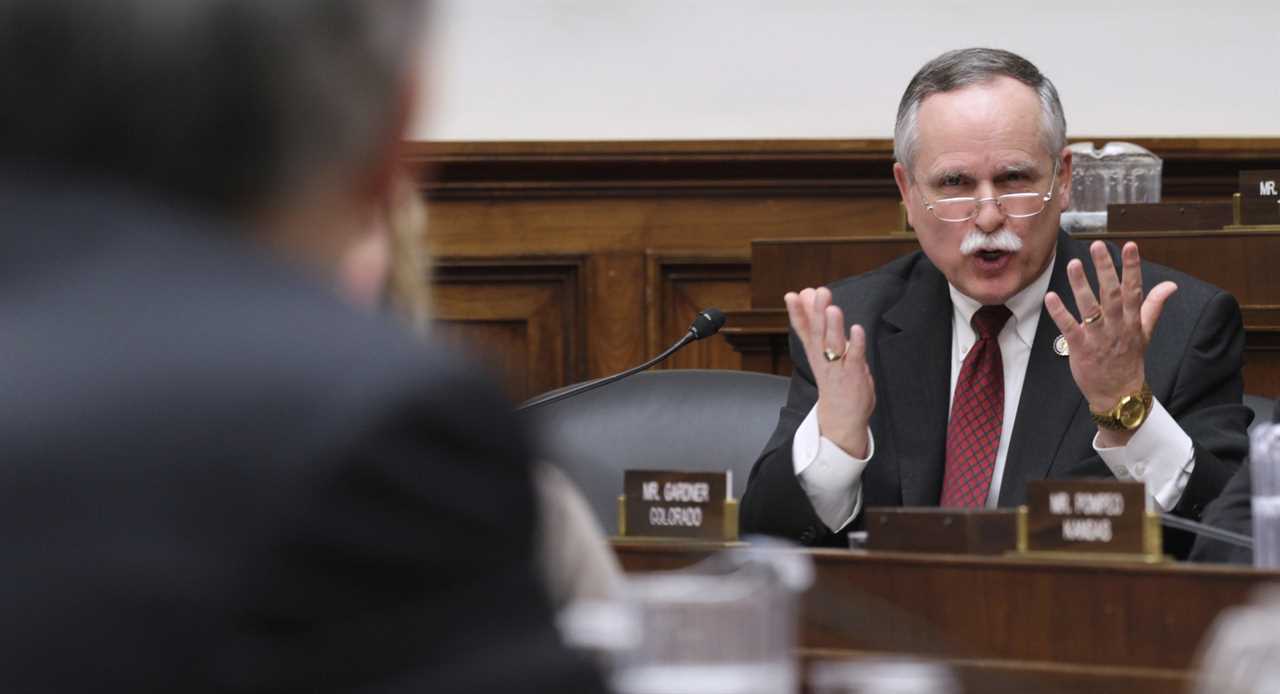
CLARKSBURG, W.Va. — On the eve of the House vote to pass a massive infrastructure bill last year, Rep. David McKinley (R-W.Va.) received a pointed call from a Donald Trump adviser: If he voted for the package, the former president would endorse his primary opponent.
But McKinley, a civil engineer by trade, had been waiting 11 years for this moment. He couldn't be persuaded, setting into motion a contentious primary that is bound to break a big rule of politics no matter who wins on May 10.
Either McKinley loses after bringing home a major federal investment in crumbling local infrastructure, or he manages the rare feat of knocking off a Trump-endorsed candidate in a Republican primary — in this case, fellow GOP Rep. Alex Mooney, who was drawn into the same district as McKinley after West Virginia lost one of its three seats in redistricting.
Their clash has turned into one of the most hard-fought Republican primaries of the midterms, testing everything from Trump’s influence and the potency of ideological purity to small government to whether a GOP congressman can sell his primary voters on the merits of a bipartisan compromise in a hyper-polarized climate.
In an interview, McKinley declined to name Trump’s messenger but recalled telling the adviser: “We have the worst conditions. Some of the roads and bridges are 50, 70 years old. We have water lines built in 1880. I can't do this. This is not a time to play politics. I'm voting for West Virginia."

Mooney cast the vote another way: “I’m willing to fight for conservatism. I think he enables and cooperates with the Democrats’ liberal agenda,” said Mooney, who did not support the the infrastructure bill, citing its cost. “He’s caving in. He’s selling out. He’s doing their bidding.”
And there’s one more big contrast roiling the race. McKinley is a 7th-generation native of West Virginia’s northern panhandle and a former state GOP chair, who has represented most of the people in the newly drawn district for years. Mooney has represented far less of the current district, and he is a former Maryland state senator whose ambition helped propel him across state lines shortly before he ran for Congress in 2014.
"I don't know the conditions of the roads and bridges in Maryland, but I do know that conditions are in West Virginia," McKinley shot back, in an oft-repeated dig at Mooney's roots.
McKinley's support for the infrastructure bill helped earn him a surprise endorsement from Republican Gov. Jim Justice, a popular figure and Trump ally. And former Secretary of State Mike Pompeo plans to endorse McKinley this month and visit the state next week to fundraise for him, his campaign told POLITICO.
Sparse polling has shown mixed results. A pro-McKinley group released a survey","link":{"target":"NEW","attributes":[],"url":"https://www.theintelligencer.net/news/top-headlines/2022/03/poll-mckinley-has-slight-edge-on-mooney/","_id":"00000180-1d25-d7c9-abf9-5db7cb390000","_type":"33ac701a-72c1-316a-a3a5-13918cf384df"},"_id":"00000180-1d25-d7c9-abf9-5db7cb390001","_type":"02ec1f82-5e56-3b8c-af6e-6fc7c8772266"}">released a survey last month showing him leading Mooney by 5 points. An internal Mooney poll from early April found him leading by 11 points, a margin similar to surveys conducted in January and February.
And the ads have been negative from the start, with McKinley slamming Mooney as an interloper from Maryland under investigation from the House Ethics Committee for potential improper use of campaign money. Mooney has shot back, calling his opponent a RINO who voted for a bipartisan committee to investigate the Jan. 6 attacks.
Yet its the pros and cons of President Joe Biden's $1.2 trillion infrastructure package and Trump's influence that have dominated the final stretch of the race. The anti-tax Club for Growth, which is backing Mooney, launched a $1.1 million ad buy last week going hard on both topics — though the spots notably lacks any direct reference to infrastructure, calling it only “Biden’s spending binge."

McKinley said he never considered voting against the bill, despite the pressure, and he touts it constantly in his campaign stops. He’s living out his political dream, traversing the state trying to help the governor determine the best uses for some of $6 billion in funds he estimates West Virginia will receive, tapping both his engineering degree and legislative experience.
At a roundtable with business and manufacturing leaders Monday morning in Clarksburg, McKinley was rattling off the benefits the state was already seeing from the legislation. Some examples: After two years of talks, Nucor Corp. announced in January it would build a steel mill in Mason County — a decision McKinley said it felt comfortable making because of the improvements in the state’s sewage, roads, bridges and broadband enabled by the infrastructure bill. The state will also get $200 million to finish Corridor H, a highway in the eastern region of the state, where construction began in the 1970s.
"I'm not worried about Idaho and Montana," McKinley said. "I'm worried about West Virginia. So I want to make sure we get our fair share."
But Mooney, a member of the House Freedom Caucus, is a limited government hardliner. He said he supports investing in infrastructure (and has voted for smaller bipartisan bills in the past), but Mooney said this particular bill was padded with superfluous nontraditional initiatives driving up the cost. Fellow GOP Rep. Carol Miller, West Virginia's other House member, also voted against it.
“The answer is to defeat this bill. Come back with a bill that's less than half the amount and do roads or bridges on it. Pass it," Mooney said. "We’re for infrastructure. We’re just not for bankrupting our country.”
The bill passed the Senate in August with 19 Republicans voting in favor, including Sen. Shelley Moore Capito (R-W.Va.).
“I've supported the infrastructure package and I'm glad that Congressman McKinley did as well,” Moore Capito said in a brief interview in the U.S. Capitol. “There's a lot of pluses to it. And for me, the pluses outweigh the minuses.”
Still, Republican polling from the Club for Growth suggests infrastructure is not popular. And the group’s president, David McIntosh, said their data suggests GOP voters see McKinley's support for the bill not as a way to bring money to the state, but as a sign of his willingness to capitulate.
“It's a good test for which direction the party is going to go in,” McIntosh said of the primary. “The whole establishment likes someone like that,” he said, referring to McKinley, “where they can count on him voting for the compromise bills, the infrastructure bills and working with the Democrats.”
Mooney said he believed he would have secured Trump's backing regardless of McKinley’s infrastructure vote. When he visited the former president to ask for an endorsement, he was armed with a 15-page memo on the race that included the two candidates’ statements about Trump dating back to 2016.
“Given my voting record, and McKinley’s honestly, I think it would have been, it would have been more noticeable if he didn't endorse me,” Mooney said.
Trump has yet to schedule a campaign rally or cut a TV ad for Mooney — which would amplify his support. Mooney did say Trump’s team had been in contact with chief of staff, Maryland state Sen. Michael Hough, to ask how they could be helpful.
On the stump, Mooney leans heavily into his Trump endorsement. While knocking doors, he told voters about the time he spent with Trump at Mar-a-Lago last year, and his campaign literature prominently features a photo of the two standing side-by-side.
“As long as you got Trump on there, you got my vote,” one man said after looking at the paper Mooney handed to him.
McKinley might also struggle to attract Trump loyalists because of a vote he took in favor of a bipartisan commission to investigate the Jan. 6 Capitol riot. Speaking at a Republican women's conference Saturday in Martinsburg, McKinley drew an audience question on the day from someone who said she was there.
In a frequently used explanation, McKinley said he voted for a bipartisan commission, similar to ones created to investigate the attack on the U.S. embassy in Benghazi and 9/11, “to get to the bottom” of it. On the trail, Mooney said voters tell him view McKinley’s vote as complicity in a witch hunt — but that he hears more complaints about his decision to back the infrastructure bill.
For other centrist Republicans, the role infrastructure has played in the West Virginia race has become a symbol of the difficulty of bringing the two parties together on any issue.
“Infrastructure used to be something that could be done on a bipartisan level. Now, you’re wrong if you voted to make your highway safe, or to bring internet service to rural communities?” said Sarah Chamberlain, the president of Defending Main Street, a super PAC that has spent some $500,000 to support McKinley.
But Chamberlain’s group’s messaging focuses less on infrastructure than on Mooney’s Maryland roots and an investigation by the House Ethics Committee into his campaign practices. McKinley has seized on both issues as well, airing ads","link":{"target":"NEW","attributes":[],"url":"https://host2.adimpact.com/admo/viewer/5210942","_id":"00000180-1d25-d7c9-abf9-5db7cb3a0000","_type":"33ac701a-72c1-316a-a3a5-13918cf384df"},"_id":"00000180-1d25-d7c9-abf9-5db7cb3a0001","_type":"02ec1f82-5e56-3b8c-af6e-6fc7c8772266"}">airing ads calling Mooney a “political prostitute” because he’s run for office in three states. “If he tried to name the starting lineup on our football team, I don't think he could do it,” he said.
Mooney said he’s been cooperating with the committee but that investigators are requesting receipts from five to eight years prior, which are hard to track down. He said he thinks McKinley’s attacks will backfire, that voters don't understand why he is attacking him for eating at Chick-fil-A.
He said the charges were over a four year period: “My campaign people like Chick-fil-A."
The carpetbagging hits didn’t work in 2014 and won’t work now that he’s spent eight years in Congress, Mooney contends. “I'm a West Virginian by choice,” he said. “Proud of that choice.”
But in his endorsement of McKinley, Justice said he had “serious concerns” with Mooney’s "ability to represent West Virginians well, after spending the majority of his time and life representing Maryland." The governor claimed to have only met with him once since taking office in 2017.
“I can document five different times. I have pictures with different ties in them,” Mooney told POLITICO, adding: “That wasn't true. That's petty anyhow, the phone works both ways.”
But McKinley often says he regularly meets local officials in Mooney’s current district who say they never see him — and that claim bore out on Monday.
"I can name on one hand, how many times he's been to our area," Buckhannon Mayor Robbie Skinner came up to tell McKinley at an event Monday. His region is home to the unfinished Corridor H highway. "And to vote against the infrastructure bill," he said. "That is the epitome of voting against your best interest."
----------------------------------------
By: Ally Mutnick
Title: Wild GOP primary hinges on roads-and-bridges dollars
Sourced From: www.politico.com/news/2022/04/12/gop-primary-west-virginia-infrastructure-00024473
Published Date: Tue, 12 Apr 2022 03:31:00 EST
Did you miss our previous article...
https://consumernewsnetwork.com/politics-us/after-food-is-left-behind-by-pandemics-fda-offices-are-occupied-by-mice






